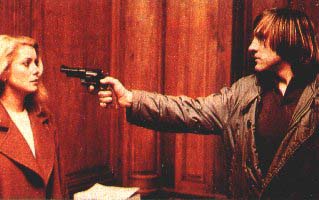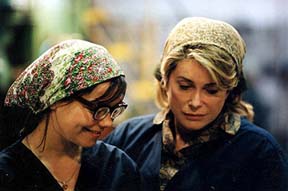Biography:
 A
model of Gallic elegance, cultivated lust object for art
house filmgoers everywhere, and one of the best-respected
actresses in the French film industry, Catherine Deneuve
made her reputation playing a series of beautiful ice
maidens for directors such as Luis Buñuel and Roman
Polanski. The daughter of French stage and film actor
Maurice Dorléac, Deneuve was born in Paris on October
22, 1943. She made her screen debut at the age of 13,
with a role in the 1956 film Les Collegiennes, and went
on to make a string of films with directors such as Roger
Vadim (with whom she had a child) before getting her breakthrough
role in Jaques Demy's charming musical, Les Parapluies
de Cherbourg (The Umbrellas of Cherbourg) (1964). The
burst of stardom that accompanied her portrayal led to
two of her archetypal ice maiden roles, first in Roman
Polanski's terrifying Repulsion in 1965 and then in Buñuel's
1967 Belle de Jour. Deneuve's startling portrayal of an
icy, sexually adventurous housewife in the latter film
helped to establish her as one of the most remarkable
and compelling actresses of her generation. She further
demonstrated her talent that year in Demy's Umbrellas
musical follow-up, Les Demoiselles de Rochefort, which
she starred in with her sister, Françoise Dorléac. A
model of Gallic elegance, cultivated lust object for art
house filmgoers everywhere, and one of the best-respected
actresses in the French film industry, Catherine Deneuve
made her reputation playing a series of beautiful ice
maidens for directors such as Luis Buñuel and Roman
Polanski. The daughter of French stage and film actor
Maurice Dorléac, Deneuve was born in Paris on October
22, 1943. She made her screen debut at the age of 13,
with a role in the 1956 film Les Collegiennes, and went
on to make a string of films with directors such as Roger
Vadim (with whom she had a child) before getting her breakthrough
role in Jaques Demy's charming musical, Les Parapluies
de Cherbourg (The Umbrellas of Cherbourg) (1964). The
burst of stardom that accompanied her portrayal led to
two of her archetypal ice maiden roles, first in Roman
Polanski's terrifying Repulsion in 1965 and then in Buñuel's
1967 Belle de Jour. Deneuve's startling portrayal of an
icy, sexually adventurous housewife in the latter film
helped to establish her as one of the most remarkable
and compelling actresses of her generation. She further
demonstrated her talent that year in Demy's Umbrellas
musical follow-up, Les Demoiselles de Rochefort, which
she starred in with her sister, Françoise Dorléac.
 Deneuve
continued to work steadily through the 1960s and 1970s
in films such as the 1970 Tristana (her second collaboration
with Buñuel) and A Slightly Pregnant Man (1973),
in which she starred with her lover at the time, Marcello
Mastrioanni (who would father her daughter, the actress
Chiara Mastrioanni). Despite or perhaps because of her
stardom, Deneuve chose to avoid Hollywood, limiting her
appearances in American films to The April Fools (1969)
and Hustle (1975). Tellingly, her most significant American
screen work of that period was probably the series of
commercials she did for Chanel perfume in the mid-'70s,
which led to the creation of her own perfume a decade
later. Deneuve also did prolific work through the 1980s,
appearing in such films as François Truffaut's
Le Dernier Métro (1980) and Tony Scott's The Hunger
(1983). The latter film saw Deneuve playing a bisexual
vampire alongside David Bowie and Susan Sarandon, and
her performance won her an indelible cult status in the
States among lesbians, goths, and artistically inclined
teenage boys. Deneuve
continued to work steadily through the 1960s and 1970s
in films such as the 1970 Tristana (her second collaboration
with Buñuel) and A Slightly Pregnant Man (1973),
in which she starred with her lover at the time, Marcello
Mastrioanni (who would father her daughter, the actress
Chiara Mastrioanni). Despite or perhaps because of her
stardom, Deneuve chose to avoid Hollywood, limiting her
appearances in American films to The April Fools (1969)
and Hustle (1975). Tellingly, her most significant American
screen work of that period was probably the series of
commercials she did for Chanel perfume in the mid-'70s,
which led to the creation of her own perfume a decade
later. Deneuve also did prolific work through the 1980s,
appearing in such films as François Truffaut's
Le Dernier Métro (1980) and Tony Scott's The Hunger
(1983). The latter film saw Deneuve playing a bisexual
vampire alongside David Bowie and Susan Sarandon, and
her performance won her an indelible cult status in the
States among lesbians, goths, and artistically inclined
teenage boys.
 In
the 1990s, Deneuve garnered further international acclaim
for her roles in several films, including the 1992 film
Indochine (for which she won a French Academy Award
and a Best Actress Oscar nomination) and two films directed
by André Téchiné in which she played
Daniel Auteuil's sister, Ma Saison Préférée
(1993) and Les Voleurs (1995). In 1996, she paid homage
to the director who had first given her fame by taking
part in the documentary L'Univers de Jacques Demy. Closing
out the final years of the 1990's Deneuve remained consistantly
working in numerous films (in 1999 alone she appeared
in no less than six, including driector Leos Carax's
controversial Pola X) and continuing to turn in compelling
performances. In
the 1990s, Deneuve garnered further international acclaim
for her roles in several films, including the 1992 film
Indochine (for which she won a French Academy Award
and a Best Actress Oscar nomination) and two films directed
by André Téchiné in which she played
Daniel Auteuil's sister, Ma Saison Préférée
(1993) and Les Voleurs (1995). In 1996, she paid homage
to the director who had first given her fame by taking
part in the documentary L'Univers de Jacques Demy. Closing
out the final years of the 1990's Deneuve remained consistantly
working in numerous films (in 1999 alone she appeared
in no less than six, including driector Leos Carax's
controversial Pola X) and continuing to turn in compelling
performances.
 In
2000 Deneuve recieved much critical attention when cast
alongside eccentric Icelandic singer Bjork in the Lars
von Trier's melancholy musical Dancer in the Dark. Though
it polarized critics and audiences alike, Dancer nevertheless
won the Palme d'Or at Cannes Film Festival and continued
von Trier's tradition of creating difficult and challanging
films that, like them or not, always seem to provolk
a strong response. — Rebecca Flint
from All Movie
Guide In
2000 Deneuve recieved much critical attention when cast
alongside eccentric Icelandic singer Bjork in the Lars
von Trier's melancholy musical Dancer in the Dark. Though
it polarized critics and audiences alike, Dancer nevertheless
won the Palme d'Or at Cannes Film Festival and continued
von Trier's tradition of creating difficult and challanging
films that, like them or not, always seem to provolk
a strong response. — Rebecca Flint
from All Movie
Guide
|
|
|
| |
|
|